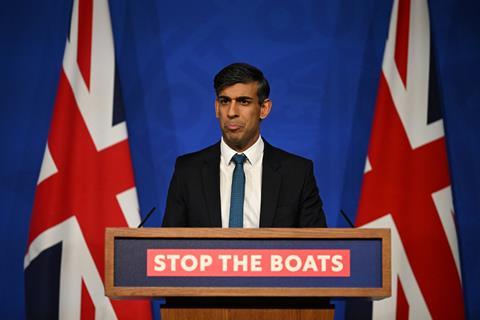The Supreme Court has declared the government’s Rwanda plan illegal. As Rishi Sunak explores emergency legislation to get round the ruling, Rev Steve Tinning says safe routes and community support – including from the Christian community – offer a more compassionate response

Five Supreme Court justices have unanimously ruled that the UK government’s plan to send asylum seekers to Rwanda is, indeed, illegal. I believe all Christians should be delighted with this verdict, but it is not yet the time to celebrate.
Let me try to explain why.
The Prime Minister has made “stop the small boats crossings” one of his five priorities for 2023. This is an ambition I can fully support. No one wants any more headlines about desperate and vulnerable people drowning in the English Channel.
But, sadly, this is where any agreement that Rishi Sunak and I might have on asylum and refugee policy comes to an end. He, along with former Home Secretaries Priti Patel and Suella Braverman, have focussed the vast majority of their energy on developing policies designed to deter asylum seekers from attempting to come to the UK.
It is clear the government still see this as simply a legal issue, not an ethical one
They have reneged on promises to deliver safe routes. They have passed legislation, most recently the Illegal Migration Act, that would have seen asylum seekers fleeing war and persecution detained and removed from the UK without ever having their case for asylum heard. I say “would have” as this act depends heavily on agreements like the Rwanda plan being enforceable and, today, the government has - for now - been told that is not possible.
Ignoring our neighbour
Senior church leaders, local ministers and Christians up and down the country have been speaking out against these hostile policies with vigour. The Joint Public Issues Team (JPIT) - a partnership between the Methodist Church, the United Reformed Church and the Baptist Union of Great Britain - led a campaign earlier this year that saw more than 1,500 church leaders say of the Illegal Migration Bill: “If ever there was a contemporary example of ignoring our neighbour and walking by on the other side, this is it.”
Last year, when the Rwanda plan was first unveiled, Rev Lynn Green, general secretary of the Baptist Union, called the “unjustifiable criminalisation and deportation” of those who were already victims of war, persecution, trafficking and torture “deeply immoral and completely contrary to the gospel of Christ, ” adding that the government’s propsals betrayed our responsibility to the international community. “Churches have always, and will always, stand alongside the poor and the vulnerable of the world,” she said. “We will never abscond our responsibility to show compassion and hospitality to those in need.”
A biblical precedent
This perspective is shared by many who believe in a God who faithfully journeyed alongside his people when they fled torture and slavery (Exodus 15-40), who constantly commanded his people not to neglect the stranger, the foreigner, the poor, the widows and the vulnerable, but to treat them as family (Leviticus 19:34, Deuteronomy 10:19, Zechariah 7:10). Jesus, himself once a refugee in Egypt, magnified such kingdom values when he pronounced blessings on those willing to welcome strangers as if they were welcoming Christ himself - and curses on those who chose instead to reject them (Matthew 25:32-46).
The writer of Hebrews too chimed in, saying: “Do not neglect to show hospitality to strangers, for by doing that some have entertained angels without knowing it” (Hebrews 13:2). You’d be hard pushed to find a biblical case for such egregious hostility to those seeking sanctuary.
So, of course, I am delighted that, for now, the government’s dream to see planes taking off to Rwanda seems a long way from being realised. And yet Sunak has pledged to transform the Rwanda plan into a treaty, and introduce emergency legislation to address the concerns raised by the ruling. Such legislation would likely need to supersede the UK’s current Human Rights Act and amend other previous laws. It may also threaten the UK’s participation in long established and widely celebrated international conventions.
While it is hard to see how any proposed actions could possibly overturn the weight of evidence that Rwanda is not currently a safe place for asylum seekers, it is clear the government still see this as simply a legal issue, not an ethical one. They do not view it as upholding our commitment to human rights, and it is certainly not about affirming the God-given dignity of everyone created in his image.
Hope for a future
So Christians must continue to make a case for a better, more compelling, hopeful and practicable plan; one that is more in keeping with the values of the kingdom of God. Those of us who have been advocating alongside refugees know that plan must include safe routes for those seeking asylum to enter the UK.
Churches will always stand alongside the poor and the vulnerable of the world
The government must work alongside the United Nations Human Rights Council to understand the global refugee crisis better. They should be offering to host an international summit to explore what responsibilities wealthier, safe countries have to asylum seekers. They should fix fair targets to welcome refugees that accurately reflect need. And they should work with people of faith and compassionate communities around the UK to find creative solutions, including investing in community sponsorship to address the housing, emotional support, health and educational needs that will be required for the UK to be a place of sanctuary.
Find out more about JPIT’s campaign to seek justice for asylum seekers at www.jpit.uk
































No comments yet